Karaoke is one of the many fun activities you can try while visiting or living in Japan. There's a whole culture around karaoke in Japan. And there're ways to enjoy karaoke even if you don't enjoy singing!! Check out why it's so beloved in Japan and everything you need to know!
Table of Contents
- What’s Karaoke and What Does It Mean?
- 8 Reasons to Try Karaoke
- Things to Keep in Mind: Price & Etiquette
- Conclusion
What’s Karaoke and What Does It Mean?

Karaoke is one of the activities that people of all ages love to do in Japan. It is very common to say “Want to go karaoke?” after class, after dinner, and especially after having drinks. After all, you can sing along to favorite songs with your classmates, coworkers and friends, while indulging in finger food and of course, more drinks!
But what does it mean??
「カラオケ karaoke」 is actually a combination of 「空 kara」 which means empty and 「オケ oke」 which is short for 「オーケストラ orchestra」.
So it means the music (orchestra) "empty" of the singing voices.
At a karaoke establishment, the music will play and the words of the song will be displayed on the screen. The part you have to sing will be highlighted as you go along, making it easy to follow the lyrics and the melody at the same time.
And the pronunciation of karaoke?
In English, many people say "carry-oh-key", but in Japanese, it's pronounced "kah-la-oh-keh".
What's the Difference Between Karaoke Box and Karaoke Bar?
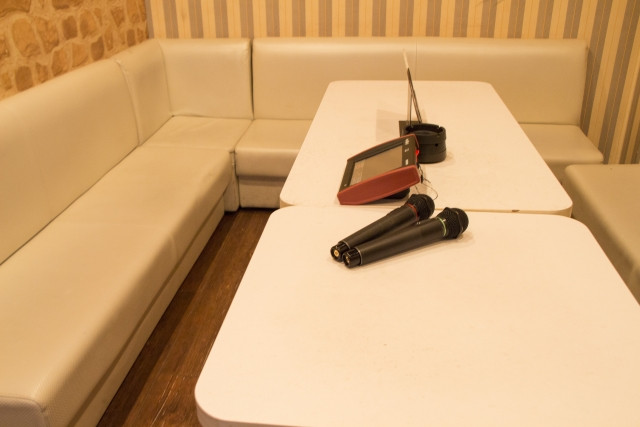
When most people talk about going to karaoke in Japan, they mean going to a karaoke box. It's a type of establishment (which started in Japan!!) with many private rooms for individuals and groups to enjoy karaoke. Each room contains a TV or projector screens, a karaoke machine (now often controlled through an ipad or similar tablet) with a huge selection of songs, microphones, and comfortable couches.
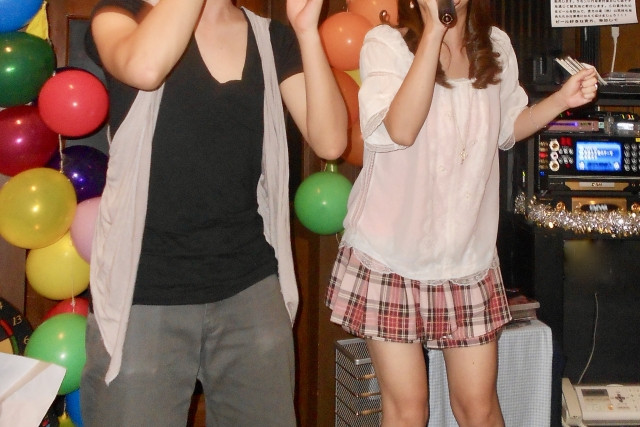
A karaoke bar, on the hand, is a bar with one karaoke machine. Anyone can sing (there may be a sign-up system), but you have to be willing to sing in front of all the patrons in the bar instead of just your group of friends and colleagues. But it also gives you a chance to drink, meet new people and enjoy various songs and people's performances that you might not have otherwise. There are also themed karaoke bars in Japan, such as anime song karaoke bars.
In this article, we will be discussing mainly karaoke boxes.
Writer's Pick
8 Reasons to Try Karaoke
If you haven’t experienced karaoke in Japan, then here are 8 reasons to persuade you to try it out! Take a look!
1. It's Your Private Entertainment Space
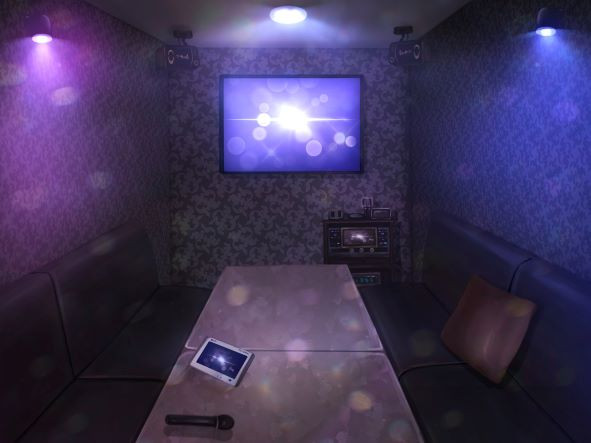
As we mentioned above, you (and your group) get your own personal room. The larger your group, the larger and more spacious the room.
And it's pretty sound-proof, so you don't have to worry too much about strangers hearing you. (Although to be quite honest, sometimes the rooms aren’t completely soundproof so you can hear people singing their hearts out as you walk down the hall to your assigned room, or when the staff happen to walk into a room with food and drinks in the middle of the song. But that's part of the experience.)
Along with the basics that you need for karaoke (the TV screen or two or three, remote controls or ipads, and microphones), each room also has a center table to accommodate food and drinks as well as sofa-like seating so you can relax like you’re in your living room. You can even adjust the lighting to set the mood!
2. For Social Gatherings and Ice Breakers
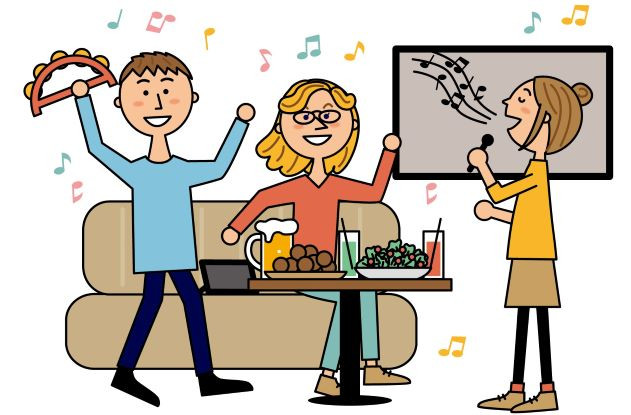
As mentioned above, karaoke is for all ages. It sounds a little strange perhaps, but many people in Japan have experienced karaoke with their boss, their team, even their clients from work. It is a place that allows you to bond with your family, coworkers, friends, colleagues, classmates, etc. after a drinking party, reunion, sports event, concert - anything really! It can even be the main event.
You can enjoy a fun karaoke session and sing your favorite tunes - and most of the time, people will choose songs that everyone knows so everyone can join in and sing along, making the experience much more communal. You can also find out what singers or genres your friends or coworkers like, and you might find something in common with them that you didn’t know before. And even if you can’t sing along, pick up a tambourine or maracas that are often in the room (or you can borrow at reception) and cheer on the singer(s).
Most karaoke places in Japan include at least some English songs in the library of songs. (You can also usually find a library of Korean and Chinese songs, especially with the popularity of K-pop.) So if you can’t sing Japanese songs, you should have other options!
(Tip: Singing classics like the Beatles, the Carpenters or Queen if you like them may delight older Japanese bosses or clients.)
3. The Visual Experience
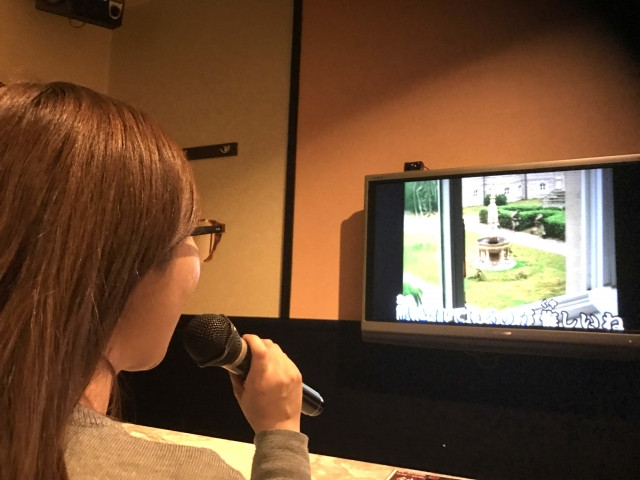
But what surprises people and makes things unintentionally hilarious are the music videos that play behind the lyrics on the screen. While more modern day songs will have the option of playing the actual music video, older songs are often accompanied by stock footage of very dramatic scenes acted out by no-name actors. While most Japanese people just ignore these videos, they can be quite funny to watch.
If you want to see the music video or actual artist in the video while performing the songs, look out for the 「本人映像 honnin eizou」sign next to the song name. This means that the artist themselves will be in the video playing on the screen. Note that this is not available for every artist, or every song. This is often quite limited to recent songs from the past few years.
4. Food and Drinks on Call
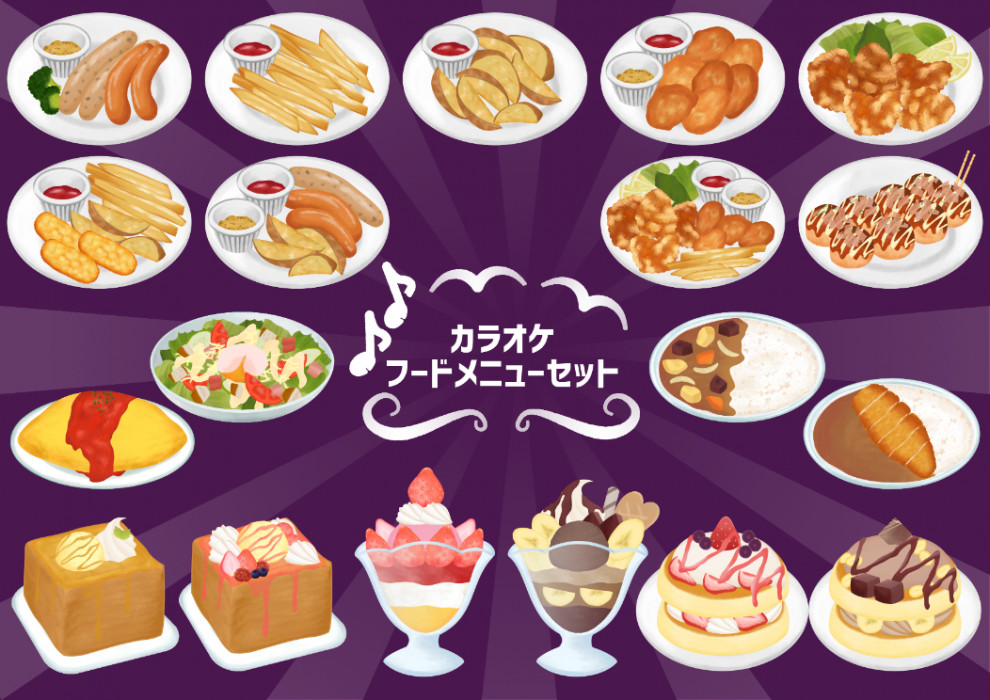
Yes, you read that right! Most karaoke rooms have telephones in them which allows you to order food and beverages. You can sit back and have your food delivered without leaving. (You might have to talk really loud or put a finger in your other ear to hear the staff on the other end while your friend belts out their favorite song though!)
Most of it is finger food to share, like fries and karaage (fried chicken), but if you go to more upscale establishments, you could get a whole meal! Some karaoke chains like Pasela are known for their yummy and elaborate desserts like honey toast.
And take advantage of the「飲み放題 nomihoudai」option which is all-you-can-drink for a set price. Then you don't have to worry about how many drinks you've ordered and how much extra it'll cost at the end, and you can quench your thirst after singing your heart out.
Just note that many establishments with food options don't allow outside food, unless specifically stated. For example, many Maneki Neko establishments allow bringing in of outside food and drink. Other locations may add an additional charge if you bring in outside food. However, if you ask ahead of time when making a reservation for things like birthday cakes, they may make exception and grant you permission.
5. Available Almost Anywhere and Anytime
One of the best things about karaoke in Japan is its accessibility. Karaoke establishments, especially big chains, are located near train stations and in entertainment districts. You can look for popular chains like Big Echo, Karaoke-kan, Karaoke no Tetsujin, Maneki Neko and more! In heavily populated areas like Shinjuku or Shibuya in Tokyo, you might find one or more per block because of how popular they are. Sometimes there are establishments right across the street from each other, and you can take your pick for best deal or availability.
Many of them in big cities are open 24 hours and on all days of the week. You don’t even need to make a reservation in advance most of the time so it’s often a spur of the moment decision to go. (Of course, if you know in advance and you’re going in a large group and/or on a popular night like weekends, it is highly recommended to make a reservation beforehand to avoid being on the waiting list for long, or worse, being turned away.)
In smaller cities, you may have less options, but there's usually some sort of karaoke establishment near a station in decent sized areas. However, in more rural areas, a karaoke bar or "snack bar" may be your only option.
6. A Great Multi-use Space - Not Singing is okay!!
Some people use the larger rooms for large groups at karaoke for purposes other than karaoke. For example, people will have birthday parties, or wedding after parties at karaoke establishments, as you can rent party rooms for large groups of people. After all, there’s no rule that says you have to sing the entire time. You could use the mic for other purposes, like making speeches and announcements!
Being able to reserve for long blocks of time is also a plus. Some establishments even have 3-hour, 5-hour, or even unlimited time plans during certain hours of the day.
Recently, to keep up with the times, the karaoke rooms either come with (or available if you ask in advance) DVD/Blu-ray players, smartphone adapter cords, projectors, etc.
Thus, common uses of karaoke rooms besides the usual include:
- movie or concert DVD viewings
- fan gatherings (places like Pasela even have special packages just for this)
- gaming room (both video/smartphone games and board games)
- practice room for singing/instruments or a place to record their demo for an audition if they don’t have the space or equipment at home
For some, it's even a place to crash for the night if they missed the last train. While sleeping is usually prohibited or advised against, it’s a safe and private space that can be cheaper than getting a hotel, especially if you only need it for 4 or so hours until the first train.
7. Solo Karaoke Option
— ひとりカラオケ専門店 ワンカラ (@1karamain) October 27, 2021
You can even go alone to karaoke, if you want to! And many people do! Sometimes there's even special prices for solo guests in major chains.
And recently, there are even locations that are specifically for 「一人カラオケ hitori karaoke」 or solo karaoke. You get a small recording booth type space with a headset to sing your heart out!
8. Learn Popular Songs & Improve Your Japanese
Music is one popular way people can connect with the culture, as well as learn the language! It can help to improve your pronunciation and intonation as well.
Karaoke ranking for the month or year are great ways to figure out popular music at a given time.
For songs that are often heard/sung at karaoke and most Japanese people would know, check out our list of "33 J-pop Songs & Artists to Know from the 90s to 2022" in our J-pop article, as well as "10 Anime Songs You Should Know" in our Anisong article.
A Few Things to Keep in Mind: Karaoke Pricing and Etiquette
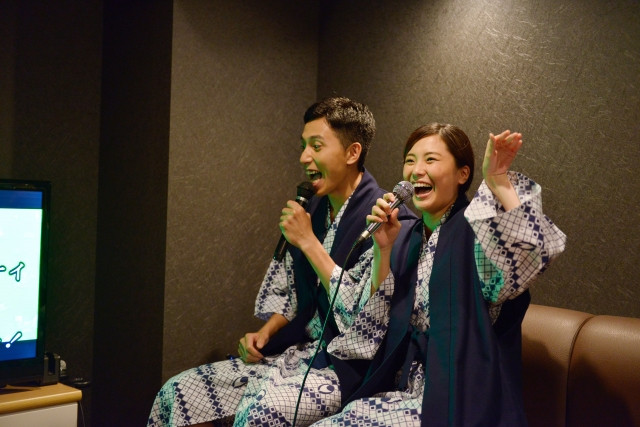
Karaoke Etiquette
-
You or at least one member of your group might have to register at reception so have ID, which you may have to show anyway if you plan to drink alcohol.
-
When going with your colleagues, only enter one song at a time you want to sing; it’s seen as rude to have the mic and sing multiple songs in a row unless everyone is singing together.
-
Offer to queue up songs for others or pass around the tablet.
-
While of course it's fine to sing your favorite songs, don't sing too many that people don't know unless the vibes are right.
-
Don’t play on your phone when it’s not your turn and don’t record people unless they allow you to.
-
Don’t be late! Even if you leave the room and get to reception a minute late, they will charge you for it. So make sure to leave enough time before the end of your time slot (which is printed on the initial receipt you get) to pack up your things and leave.
Karaoke Pricing
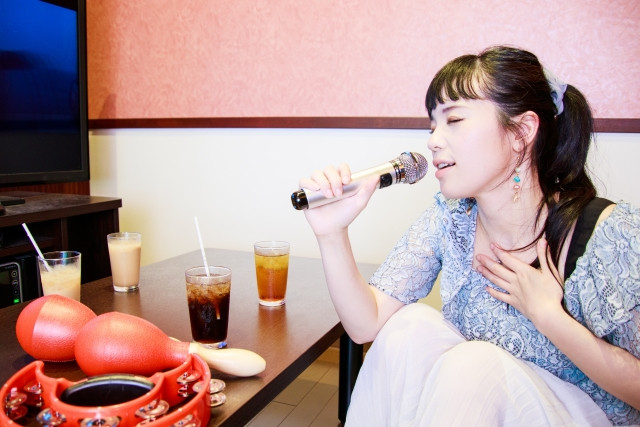
Each karaoke location is different so you have to check for prices and rules, but here are some general tips and average prices.
-
You do have to inform reception how long you plan to stay initially and which package price you intend to pay; however extensions may be allowed as long as there aren’t groups waiting or that reserved the room after you
-
Food and drinks cost extra unless included with the initial price
-
Becoming a member and/or downloading the app may be required/suggested, but it comes with discounts and coupons for members.
The charges are based on time of the day, how long you stay, and to a certain extent, the size/special features of the room and location.
If you want to go during the evening or night, the price will be higher in comparison to during the afternoon. You also experience a surge in prices during weekends and national holidays, considering high demand.
For example, take one of the major karaoke chains, Big Echo. You get a discount at any Big Echo location if you are a member, but as many people choose to go to karaoke on a whim to whatever the closest location is, there’s reasonable prices for nonmembers as well. Prices are shown on the website per location for every 30-minute increment (other chains may have prices by the hour) or blocks of time (3 hours, 5 hours, etc).
Here's a general price range to consider for karaoke places in Tokyo near a decent sized station.
For example, for members (all of the following are the paying per drink option):
| Day and Time | Price (per person) |
| All days until 18:00 | 220 yen per 30 minutes |
| Weekdays from 18:00 | 380 yen per 30 minutes |
| Weekends from 18:00 | 450 yen per 30 minutes |
※Big Echo, ”Nakano Station Branch"
but by Shinjuku Station, a major station:
| Day and Time | Price (per person) |
| All days until 18:00 | 220 yen per 30 minutes |
|
Weekdays, Sundays, holidays |
550 yen per 30 minutes |
| Fridays, Saturdays, night before holidays from 18:00 |
680 yen per 30 minutes |
※Big Echo, "Shinjuku East Exit Branch"
Also note that certain months, such as July and August, may have special prices because of long vacations such as summer vacation.
There may be discounts for groups, students, seniors, for longer blocks of time, special campaigns, etc.
Also downloading the karaoke app from the karaoke chain makes making reservations easier, gives you special discounts, informs you of special events, etc.
Conclusion
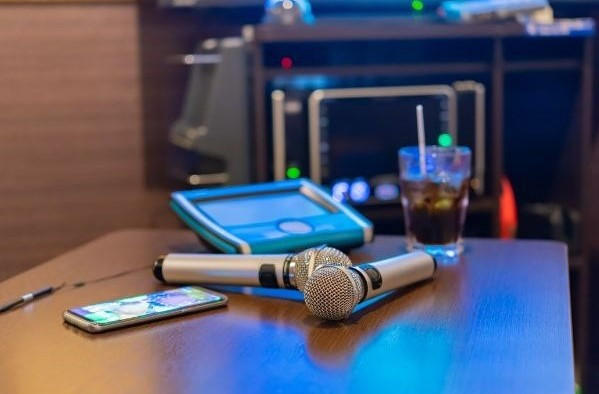
Karaoke in Japan is one way for people to relax and get to know each other through music. It’s quite the experience so if you’re visiting, make sure to schedule some time to go. And if you’re in Japan and have been invited to a karaoke outing with classmates or colleagues, we hope this article was helpful in terms of what to expect!
Recommendations for readers of this article
Japanoscope (English)
If you are interested in karaoke, I also recommend this article.
You'll learn more about Gurenge, the song that became a hit in Japan!
https://japanoscope.com/gurenge/










.jpg)
.jpg)







 (2).png)
















